Mouthwashes: What types are there and how do they work? Here you will find an overview of the products and lots of tips on how to use them.
Mouthwashes are a popular addition to daily dental care that can provide many benefits – from fighting bad breath to preventing tooth decay.
However, with so many products available on the market, it can be difficult to find the right mouthwash for your needs.
In this article, you will find out what types of mouthwash there are, how they work and what you should look out for when choosing one.
| Get 150 € discount on your dental correction! |

Book a consultation appointment now at a nearby DrSmile partner practice and find out if teeth straightening with aligners is right for you.
The appointment is completely non-binding and does not involve any costs.
With the code “THATSMILE150” you will receive 150 € discount on the treatment.
What types of mouthwash are there?
Mouthwashes can be roughly divided into two main categories: Cosmetic and medicated mouthwashes.
Both have their specific advantages, with medical rinses often having a therapeutic effect achieved by ingredients such as fluoride or antibacterial agents.
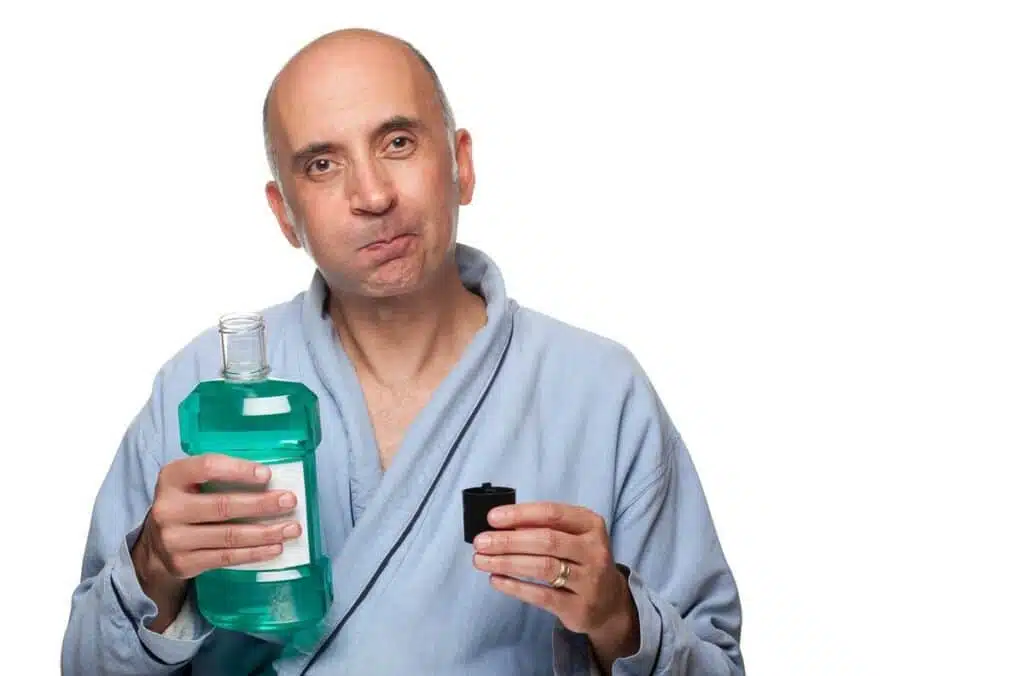
1. cosmetic mouthwashes
Cosmetic mouthwashes are primarily designed to freshen the breath. They combat bad breath by temporarily neutralizing the odour-causing bacteria in the mouth.
Cosmetic mouthwashes often contain extracts such as peppermint or menthol. The ingredients and color additives can vary.
However, these rinses have no long-term health benefits for teeth or gums.
They offer a quick and easy solution to bad breath, but are not a sustainable method of promoting oral health.
2. medicated mouthwashes
Medicated mouthwashes have a targeted effect and contain ingredients that help against certain problems in the mouth. These include
- Mouthwashes containing fluoride: These rinses contain fluoride, which strengthens the tooth enamel and thus protects against tooth decay. They are ideal for people who have an increased risk of tooth decay, for example due to dentures, braces or a tendency towards sensitive teeth.
- Antibacterial mouthwashes: These rinses contain ingredients such as chlorhexidine or essential oils that fight bacteria. They are particularly helpful for gum diseases such as gingivitis or periodontitis, as they reduce inflammation and significantly lower the bacterial load in the mouth.
- Mouth rinses against plaque: These rinses have a targeted effect against plaque, i.e. the soft plaque that forms due to bacteria and can cause tooth decay and gum disease. They are helpful in preventing plaque and supporting daily dental care.
- Alcohol-free mouthwashes: This option is particularly suitable for people who have sensitive gums or want to avoid alcohol in mouthwashes. Alcohol-free mouthwashes often offer the same benefits as their alcohol-containing counterparts without unnecessarily irritating the oral tissue.
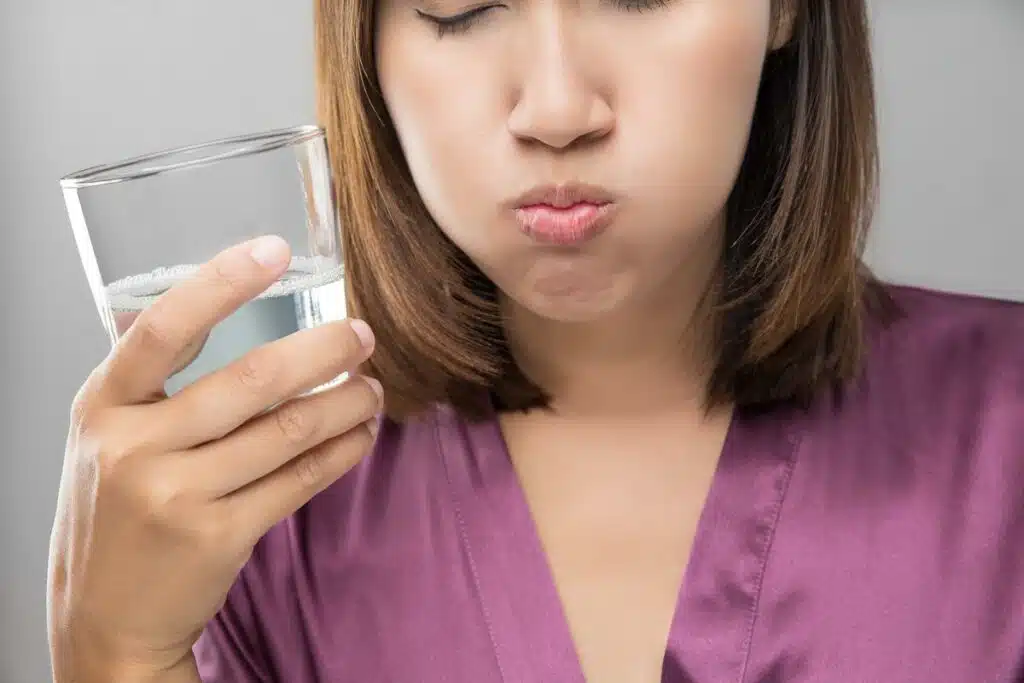
How do mouthwashes work?
The effectiveness of mouthwashes depends on their ingredients. Basically, all mouthwashes have the ability to reduce bacteria in the mouth, which helps to improve oral hygiene.
Medicated mouthwashes with fluoride strengthen tooth enamel and prevent tooth decay, while antibacterial rinses inhibit the proliferation of bacteria that can cause gingivitis and plaque.
Mouthwashes with antibacterial ingredients are particularly effective in the prevention and treatment of gum disease.
They penetrate into hard-to-reach areas of the mouth, such as between the teeth, and help to eliminate bacteria that cannot always be completely removed by brushing and flossing.
This makes them a valuable addition to daily dental care, especially for existing gum problems.
Mouthwashes containing fluoride act primarily on the tooth enamel by remineralizing it and thus making it more resistant to acid attacks.
This can significantly reduce the risk of tooth decay, especially in people who are more susceptible to dental disease.
Who are mouthwashes suitable for?
Mouthwashes are generally suitable for anyone who wants to improve their daily oral hygiene.
People with gum disease, an increased risk of tooth decay or a tendency towards bad breath in particular can benefit from regular use.
However, it is important to choose the right mouthwash for your individual needs and to pay attention to the ingredients.
If you are unsure or have existing dental disease, it may be advisable to consult a dentist.
| Get 150 € discount on your dental correction! |

Book a consultation appointment now at a nearby DrSmile partner practice and find out if teeth straightening with aligners is right for you.
The appointment is completely non-binding and does not involve any costs.
With the code “THATSMILE150” you will receive 150 € discount on the treatment.
Step-by-step instructions for using mouthwashes
We have put together a step-by-step guide here so that you can use the mouthwash correctly and maximize its effect:
- Measure out the correct amount
Pour about 10 to 20 ml of mouthwash into the lid or a small jar. The exact amount depends on the product, so pay attention to the recommendation on the packaging. - Rinse and gargle
Put the mouthwash in your mouth and move it vigorously back and forth for 30 seconds to a minute. Make sure that the liquid reaches all areas of the mouth, including the spaces between the teeth. You can also gargle the mouthwash in your throat for a few seconds to reach the back of the mouth. - Spitting out
Spit out the mouthwash after use. Important: The liquid must not be swallowed as it may contain dissolved bacteria and deposits. - Do not rinse immediately
To achieve the full effect of the mouthwash, you should wait at least 30 minutes after rinsing before drinking anything or rinsing your mouth with water. This allows the active ingredients to work optimally. - Repeat use regularly
For the best results, the mouthwash should be used daily. Depending on the product, you can use it once or even twice a day – again, follow the manufacturer’s instructions or your dentist’s recommendations.
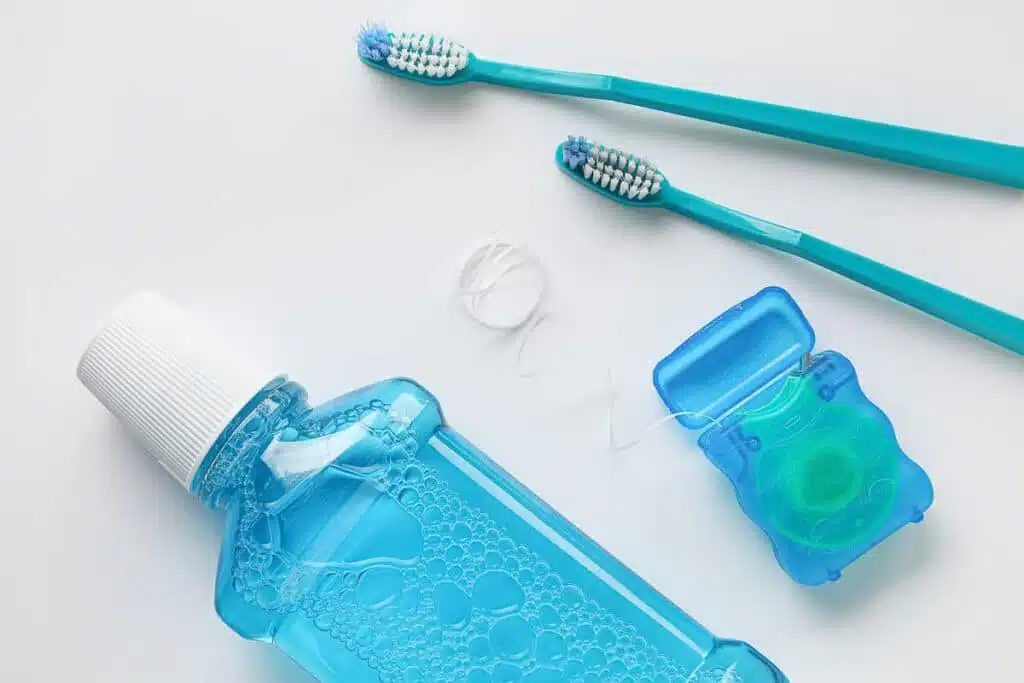
Can the mouthwash be used directly after brushing my teeth?
If you use a mouthwash without fluoride, you should not use it directly after brushing your teeth.
The reason for this is that brushing your teeth with fluoride toothpaste leaves a protective film on the teeth, which helps to strengthen the enamel and protect against tooth decay.
If you use a mouthwash without fluoride immediately after brushing your teeth, this protective film can be rinsed off and the effect of the fluoride reduced.
It is therefore advisable to either use a mouthwash containing fluoride or to wait at least 30 minutes after brushing your teeth before using a mouthwash without fluoride to ensure the full protective effect of the toothpaste.
Alternatively, the mouthwash without fluoride can of course also be used before brushing your teeth.
Conclusion: Mouthwashes as a useful addition to dental care
Mouthwashes are an effective addition to daily dental care and can help to promote oral health.
Whether to combat bad breath, prevent tooth decay or help with gum disease – the right mouthwash can help you keep your teeth and gums healthy in the long term.
By knowing the different types of mouthwash and their specific effects, you can make the best choice for your needs.
With the right application, you can integrate a valuable measure into your daily dental care routine.
| Get 150 € discount on your dental correction! |

Book a consultation appointment now at a nearby DrSmile partner practice and find out if teeth straightening with aligners is right for you.
The appointment is completely non-binding and does not involve any costs.
With the code “THATSMILE150” you will receive 150 € discount on the treatment.
FAQs on the topic of mouthwashes
Here we answer a few of the most frequently asked questions about mouthwashes.
What is a mouthwash good for?
Mouthwashes are a supplement to daily dental care. They help to reduce bacteria in the mouth, freshen breath and can prevent tooth decay and gum disease. Certain mouthwashes also have a medicinal effect and provide targeted support in combating plaque, tooth decay or gum problems.
Can mouthwash replace brushing your teeth?
No, mouthwash cannot replace brushing your teeth. It is merely a supplement to daily dental care. Mouthwashes reach areas of the mouth that are difficult to access with a toothbrush and can therefore improve oral hygiene. However, regular brushing is still essential to remove plaque and deposits.
How often should you use mouthwash?
It is recommended to use mouthwash once or twice a day – ideally after brushing your teeth (for fluoride-containing rinses) or 30 minutes after brushing your teeth (for rinses without fluoride). Mouthwash can be particularly useful in the evening before going to bed, as it helps to reduce bacteria that accumulate in the mouth during the night.
Is it better to use a mouthwash with or without alcohol?
This depends on your personal needs. Mouthwashes with alcohol often have a stronger antibacterial effect, but can cause irritation if you have sensitive gums or oral mucosa. Alcohol-free mouthwashes are a gentler alternative and offer the same benefits without the risk of irritation.
Can a mouthwash permanently eliminate bad breath?
Mouthwashes can temporarily eliminate bad breath by fighting the odor-causing bacteria in the mouth. However, a mouthwash is not a permanent solution if the bad breath is due to other causes such as tooth decay, gum disease or stomach problems. In such cases, a dentist or doctor should be consulted.
Which mouthwash is right for me?
Choosing the right mouthwash depends on your individual needs. For example, if you are prone to tooth decay, you should choose a mouthwash containing fluoride. If you have gum problems, antibacterial rinses with ingredients such as chlorhexidine are a good choice. Cosmetic mouthwashes, on the other hand, are particularly suitable for quick breath freshening.
Can mouthwash be used during braces treatment?
Yes, mouthwash is particularly recommended for braces wearers as it helps to clean the hard-to-reach areas around the brackets and wires. Mouthwashes containing fluoride can also help to reduce the risk of tooth decay during treatment.
Should I rinse my mouth with water after mouthwash?
After using a mouthwash, you should not rinse your mouth with water. This would dilute the active ingredients of the mouthwash and reduce its effect. It is better to wait at least 30 minutes after use before drinking or rinsing your mouth.
Are there any side effects when using mouthwashes?
Most mouthwashes are safe when used properly. However, some antibacterial mouthwashes, especially those containing chlorhexidine, can cause discoloration of the teeth or changes in taste if used for a long period of time. These side effects usually disappear as soon as the application is stopped.
At what age is mouthwash suitable?
Mouthwashes are generally suitable for children from the age of around 6 years, as soon as they are able to use the rinse safely and not swallow it. It is important to choose a child-friendly mouthwash without alcohol and to always supervise its use.
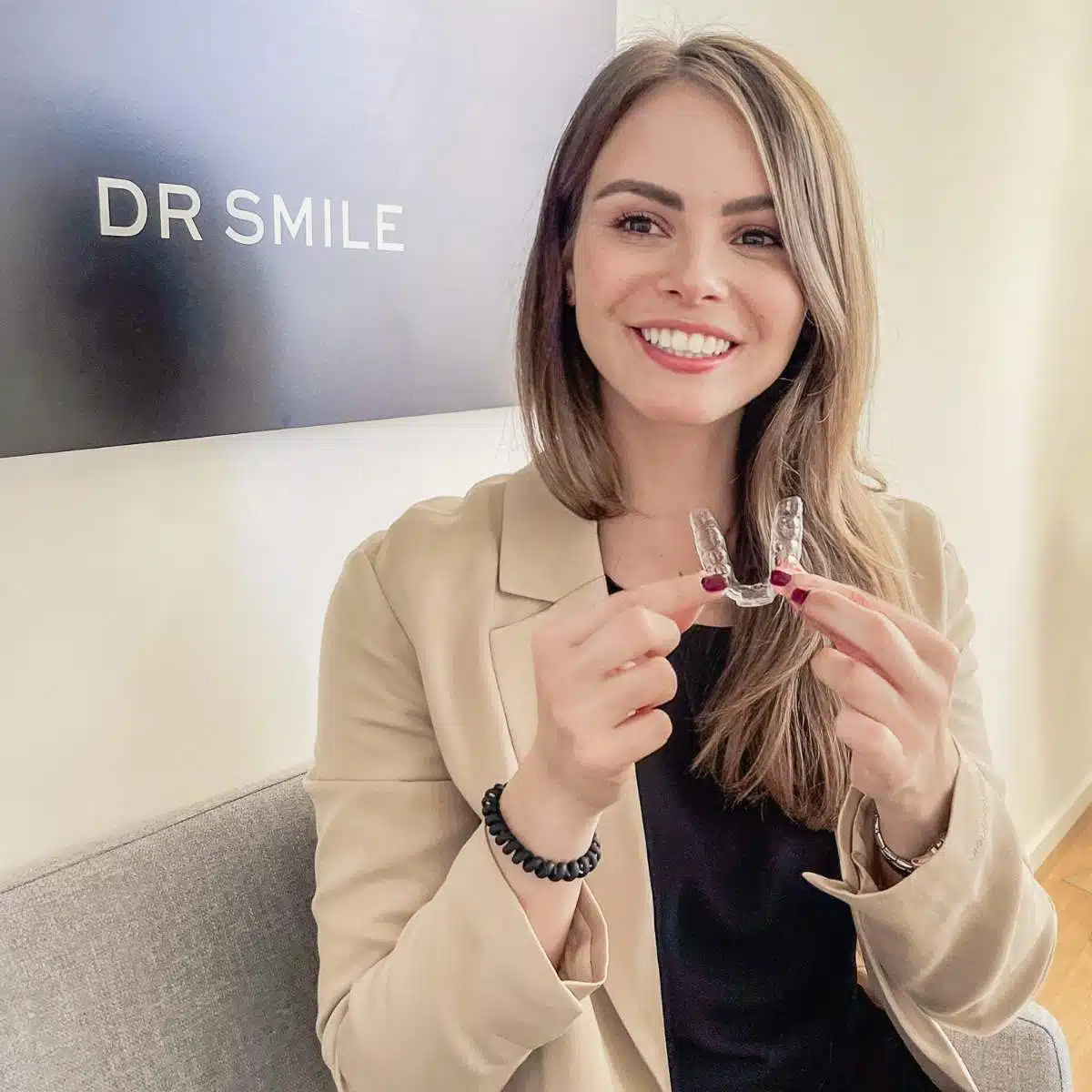
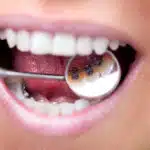

Leave a Reply